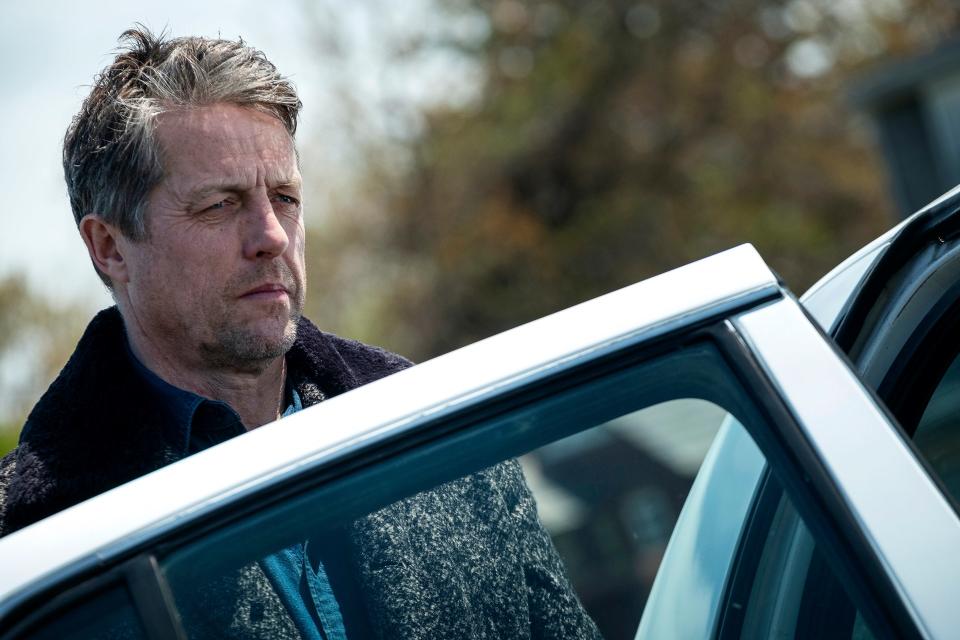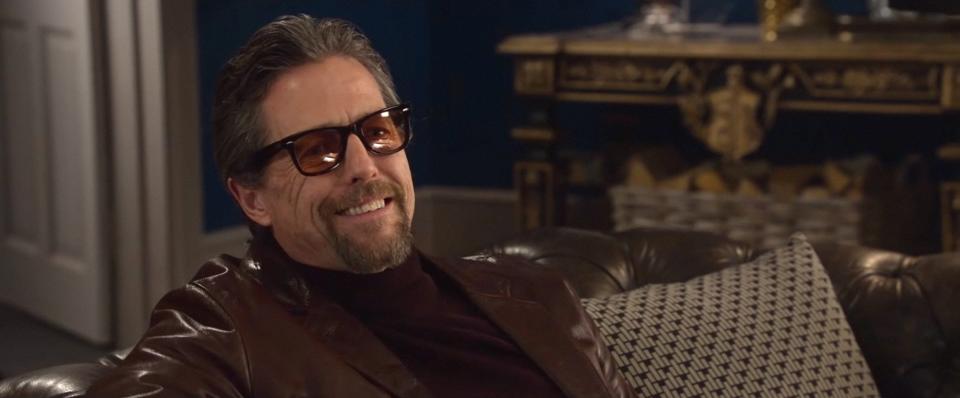The Undoing Completes Hugh Grant’s Thrilling, Unexpected Switch to the Dark Side
- Oops!Something went wrong.Please try again later.
By the end of the second episode of The Undoing, things aren’t looking so good for Jonathan Fraser, the pediatric oncologist played by Hugh Grant. When Elena (Matilda De Angelis), the mother of a student who attends the same exclusive private school as Jonathan’s son, is found murdered, all signs point to him as the culprit. Sure, he doesn’t seem like the sort of man who could brutally bludgeon a woman to death with a sculpting hammer, but what explains his disappearance after the murder? What explains the cell phone he left behind in the home he shares with his wife, Grace (Nicole Kidman), after he told her he’d be attending a conference in Cleveland? Or that he’s spent months covering up that he lost his job? And, well, despite their seemingly perfect marriage, Jonathan was having an affair with Elena, and maybe even fathered a child with her. It’s not a problem a man can talk his way out of.
That doesn’t stop Jonathan from trying. Though absent through most of the second episode, Jonathan shows up at the end, surprising Grace at their beach house then covering her mouth and kissing her temple while insisting he didn’t do it. Then he just keeps talking. At first he keeps looking down, then to the side, then he makes and attempts to hold eye contact with Grace, knowing that if he can just get her to look and listen, he can win her over. Any resemblance to scenes of the younger Grant playing characters pleading their case to the women they loved in far less murderous contexts might be accidental, but it’s also impossible to ignore.
Jonathan’s persuasion doesn’t work, at least not immediately. There’s no reason for Grace, a therapist who knows a thing or two about unhealthy relationships, to forgive him. But even though she ends up calling the police on her husband at the end of their unexpected reunion, Kidman’s eyes make clear that Grace’s defenses have already started to crumble. Before long, they’ve fallen entirely. An adaptation of Jean Hanff Korelitz’s 2014 novel You Should Have Known written and produced by David E. Kelly and directed by Susanne Bier, The Undoing works as both a slowly unfolding mystery and the story of a man exploring the limits of his ability to charm — if any such limits exist.

3 Hugh Grant sleazy roles gq november 2020
With one episode to go, it’s still unclear if Jonathan is the murderer, but he’s certainly not a nice guy. Grant doesn’t play nice guys all that often anymore, despite breaking through as the consummate nice guy in the Richard Curtis-penned romantic comedy Four Weddings and a Funeral in 1994 then spending much of the rest of the ’90s offering variations on the same fluttery-eyed, floppy-haired character. If he repeated himself, it was hard to complain too much. He was always just so damn charming; his witty lines and halting delivery suggested an almost unnatural sort of earnestness, as if he believed in the unshakable honesty of every word he said and his happiness and faith in humanity depended on making the person he’s talking to believe him. When Charles stops Carrie (Andie MacDowell) on the street to tell her, in the words of David Cassidy (“while he was still with the Partridge Family”), that he thinks he loves her, it’s like he’s coming to the revelation on the spot. Who wouldn’t be swayed?
His characters have changed since then, but only up to a point. To witness Grant’s three-part heel turn in Paddington 2, the BBC miniseries A Very English Scandal, and The Undoing is to watch an actor who knows how to weaponize his charm. His recent characters have all the charisma of the roles that made him famous—but now as a wrecking ball laying waste to those around them.
Grant began drifting toward the darkness nearly 20 years ago. He played a cad in two Bridget Jones movies, but one so irresistible poor Bridget (Renée Zelwegger) can’t resist getting burned by him again and again. (Only his character’s apparent death in Bridget Jones’s Baby takes him out of the picture.) As the wealthy layabout Will Freeman, Grant floats through the early scenes of 2002’s About a Boy lying to get what he wants. But Will remains honest in voiceover, and much of the drama comes from him finding a way to align that inner monologue with the false earnestness Will’s long used as a mask, to finally turn him into the man he pretends to be, to convert him, in other words, into the sort of character Grant used to play.
Those slightly iffier characters play like minor-key variations on Grant’s screen persona. His more recent work, however, has found the dark side always beneath the surface of his twinkly allure. In Paddington 2, Grant plays Phoenix Buchanan, a washed-up actor who refers to himself as a “West End legend” without a trace of irony. Buchanan’s still-formidable talent allows him to act as a criminal master of disguise, but his bottomless self-regard has erased any scruples about hurting anyone who stands in his way, even adorable bears. Yet the charm persists. Even after he’s framed poor Paddington and put his life in danger, it’s still nice to see Phoenix get something like a happy ending as the star of his prison’s theatrical productions.

2 Hugh Grant sleazy roles gq november 2020
Grant has the rare ability to project absolute conviction of his own rightness, even when he’s playing guilty men, as if simply saying something with a tone of heartfelt conviction is enough to make it right and true. In the fact-based A Very English Scandal, Grant plays disgraced politician Jeremy Thorpe with the confidence of a man who’s gotten his way so long that he assumes that the world should cater to his desires no matter what, in large part because he can win anyone over with a smile and a few clever words. He embarks on a relationship with the stable boy, Norman Josiffe (Ben Whishaw, the voice of Paddington, to add an extra layer of discomfort), knowing at the very least he’s taken advantage of a troubled, economically unstable younger man, but still brings a chipper inflection to his hilariously impersonal seduction. (“Just hop on all fours, there’s a good chap. That always works best, don’t you think?”)
Charm doesn’t always work that way. On screen, Jude Law possesses many of the same qualities as Grant, but he tends to play characters whose wit and warmth can’t hide their guilty consciences. For instance, in Sean Durkin’s chilly new ’80s character study The Nest, Law plays a trader finding the limits of his charisma. He’s all smiles and persuasive small talk until the flop sweat spoils the illusion. Law’s characters always seem to be hiding something or working a hidden agenda. By contrast, Grant plays men so capable of suggesting bottomless conviction they can get away with anything, maybe even murder.
As skilled as he is using those tools, he has thrown them aside from time to time. Like everyone else in Tom Tykwer and the Wachowskis’ 2012 opus Cloud Atlas, Grant plays several roles. Some are within his comfort zone, like the deceptive, but ingratiating (and murderous) operator of a nuclear power plant. Others, like the brutal chief of a post-apocalyptic cannibal tribe are, to say the least, a departure. His role in Guy Ritchie’s 2020 crime thriller The Gentlemen offered nearly as drastic a change of pace. Grant plays Fletcher, a sleazy journalist/blackmailer/screenwriter trying to get the better of London’s most-established marijuana entrepreneur. Grant makes no attempt to make Fletcher seem like anything but a scumbag, discarding some of his trademarks by obscuring his eyes behind opaque sunglasses, slicking back his hair, and speaking in a pretty good approximation of Michael Caine’s voice. It works in part because of the shock of seeing Grant play such an unapologetically shady character, but Fletcher has so many of the film’s best lines it’s hard not to root for him anyway. In the amoral world of Ritchie’s London gangland, his wit sets him apart. (So maybe Fletcher’s not so different than his usual characters after all.)
Whether Jonathan killed the lover and mother of his child in a brutal outburst then fled the scene to avoid the responsibility remains, at this moment, an open question. (So does whether The Undoing—which has used superb acting to paper over its increasingly bizarre plot twists—will reach a satisfying conclusion.) But no matter the outcome, it’s thrilling to watch Grant play the sort of creep that only he could play, one that cashes in all the accumulated goodwill built up playing the achingly sincere nice guys — the sort of nice guy who could bend the world to his will with a well-timed grin and some thoughtful blinks of the eye—and do a lot of harm if he didn’t give a damn who got hurt in the process.
Originally Appeared on GQ

